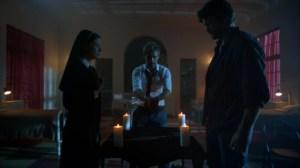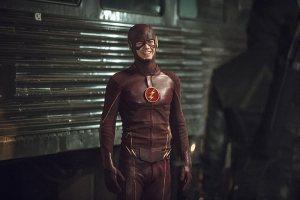Remember how for around a 3-month period late last year you simply could not escape Fox’s incessant advertising for its new Greg Kinnear drama Rake? Here’s one of them:
There was another one which ended with Greg Kinnear in bed with a hot girl, asking her to pull out one of his teeth with a pair of pliers. It all came off like an unintentional parody of the modern TV anti-hero. In Rake’s case, come watch our show about a guy who’s a total cad, says whatever he wants, habitually punishes those who suffer the misfortune of remaining in his social circle, has seemingly nothing but fatal flaws (gambling addiction, womanizing, etc.), and just generally doesn’t give a damn about any of it because he’s a total badass. Plus, the ladies love him. He’s just like Dr. House!
I have no idea if Rake was actually a good TV show because I never watched it. I never watched it because all I could think when I watched the trailers was, “Oh no, not another one of those kinds of shows.” Of course, Rake was a bit more blatant about it than most, with the sole selling point being, “Look! It’s Greg Kinnear playing a lovable asshole! He loves doing that!” However, the anti-hero is still all around us, even with the tortured souls at the center of Breaking Bad, Boardwalk Empire, Californication, Sons of Anarchy, and Mad Men either gone for good at this point or soon to depart. Showtime still has a ton of them, be it Masters of Sex’s often despicable Dr. Masters (Michael Sheen), the tough-as-nails enforcer played by Liev Schrieber on Ray Donovan, Dominic West’s adulterous husband on The Affair, Don Cheadle’s business consultant spin doctor on House of Lies, or seemingly everyone on Shameless. No one would ever dare call Kevin Spacey’s ambitious congressman at the heart of Netflix’s House of Cards a nice man, and James Spader’s bad-guy-working-with-the-cops character on NBC’s The Blacklist is kind of the definition of the anti-hero. Plus, Hanneibal Lector and Norman Bates, two of film’s most legendary serial killers, both have their own TV shows at this point.
Author Brett Martin even wrote an entire book about TV’s pre-occupation with the anti-hero, Difficult Men: Behind the Scenes of a Creative Revolution from The Sopranos and The Wire to Mad Men and Breaking Bad. His general argument is that this all started with Tony Soprano, who was a monstrous human being who still managed to feel like a human being despite his montrosity. That then became the model for the next decade of television, be it the “narcissistic adulterer on Mad Men, the serial killer on Dexter, and so on.” But a byproduct of that being the primary model for the 10+ years of television post-Sopranos is that it gets pretty dang old rooting for the anti-hero.
 Take, for example, the title character of NBC’s Constantine, a slightly watered down adaptation of DC/Vertigo’s Hellblazer/Constantine comics about a cigarette-smoking, street magician who is by all accounts a bit of a bastard. I originally gave up on the show after its first three episodes, mostly because I came away more wanting to simply re-watch old episodes of Supernatural than stick around to see how John Constantine (Matt Ryan) defeated the show’s big, looming threat somewhat unimaginatively called “The rising darkness.” I’ve been giving it a second chance this week, catching up with it through Hulu, and it’s definitely improved. [Spoiler Warning: I’m about to talk in-depth about Constantine‘s mid-season finale] The mid-season finale in which we met an ex-lover, Anne Marie, of Constantine’s who had since become a nun and needed his help tracking down some stolen babies is arguably their finest hour to date, filling in even more of John’s back story and giving him a female foil who called him on his bullshit. For instance, when we discovered that John actually went trolling for women at bars shortly after sleeping with Anne Marie for the first and only time so many years ago we hear the story from her, not him, laced with all the justified anger she has about it. He has no response for her when she argues that she deserved more respect than that. This is also an episode, however, that eventually got to a point where Anne and John shared a passionate romantic embrace because although Constantine may be willing to point out John’s flaws he’s still the main character of the show. We are still supposed to believe, as Anne Marie eventually does, that John only acts like such a jerk most of the time because that’s the only way he can do his job, and his job is to use magic to fight evil and save people. He’s ultimately a hero, a snarky, British one, but a hero nonetheless.
Take, for example, the title character of NBC’s Constantine, a slightly watered down adaptation of DC/Vertigo’s Hellblazer/Constantine comics about a cigarette-smoking, street magician who is by all accounts a bit of a bastard. I originally gave up on the show after its first three episodes, mostly because I came away more wanting to simply re-watch old episodes of Supernatural than stick around to see how John Constantine (Matt Ryan) defeated the show’s big, looming threat somewhat unimaginatively called “The rising darkness.” I’ve been giving it a second chance this week, catching up with it through Hulu, and it’s definitely improved. [Spoiler Warning: I’m about to talk in-depth about Constantine‘s mid-season finale] The mid-season finale in which we met an ex-lover, Anne Marie, of Constantine’s who had since become a nun and needed his help tracking down some stolen babies is arguably their finest hour to date, filling in even more of John’s back story and giving him a female foil who called him on his bullshit. For instance, when we discovered that John actually went trolling for women at bars shortly after sleeping with Anne Marie for the first and only time so many years ago we hear the story from her, not him, laced with all the justified anger she has about it. He has no response for her when she argues that she deserved more respect than that. This is also an episode, however, that eventually got to a point where Anne and John shared a passionate romantic embrace because although Constantine may be willing to point out John’s flaws he’s still the main character of the show. We are still supposed to believe, as Anne Marie eventually does, that John only acts like such a jerk most of the time because that’s the only way he can do his job, and his job is to use magic to fight evil and save people. He’s ultimately a hero, a snarky, British one, but a hero nonetheless.

Anne Marie – If they kill her off when the show returns next month I…won’t be surprised, but I won’t like it
So, some episodes may open with John sneaking out the window out of a one night stand whose boyfriend has dropped by unexpectedly, and another may close with John kind of tricking a friend into being possessed by demon and dying in the process. But it’s all okay because that’s just John being John. He’s a tortured soul, his every action ruled by the immense guilt he feels over how thoroughly wrong everything went when he tried to exorcise a demon from a little girl. All of this is basically true to the comics, but it’s interesting that one of the guys who wrote those comics, Garth Ennis, eventually grew to hate the character of John Constantine, telling Vulture.com earlier this year:
“I’ve known a few too many lovable rogue/wide-boy types in real life to find the notion attractive, people who abuse their friends, disappear for a while, then come back and do it again because they know they’ll be forgiven. I’ve no desire to write a character who essentially gets his pals killed and then explains that they were doomed anyway, so why not just spend their lives and use them up.”
 I have read some of the Hellblazer/Constantine comics, and I’ve now seen every episode of the TV show. Garth Ennis’ summation of the character is not wrong. In fact, within the opening pages of the New 52 Constantine he gets one of his pals killed but justifies it because that friend was doomed anyway. This makes for compelling reading and viewing, but I sometimes wonder whether or not I even like John Constantine. They’re definitely trying to make him more likable in the TV version, and I’d prefer him and his Spike from Buffy the Vampire Slayer attitude over the comparatively milquetoast lead from Grimm, the NBC show that airs before Constantine. However, there’s a part of it that feels like I’ve seen this particular character dynamic play out one too many times already. I’m ready to like a hero who is just a genuinely nice guy again.
I have read some of the Hellblazer/Constantine comics, and I’ve now seen every episode of the TV show. Garth Ennis’ summation of the character is not wrong. In fact, within the opening pages of the New 52 Constantine he gets one of his pals killed but justifies it because that friend was doomed anyway. This makes for compelling reading and viewing, but I sometimes wonder whether or not I even like John Constantine. They’re definitely trying to make him more likable in the TV version, and I’d prefer him and his Spike from Buffy the Vampire Slayer attitude over the comparatively milquetoast lead from Grimm, the NBC show that airs before Constantine. However, there’s a part of it that feels like I’ve seen this particular character dynamic play out one too many times already. I’m ready to like a hero who is just a genuinely nice guy again.
 That’s what makes spending time with someone like The Flash’s Barry Allen (Grant Gustin) so refreshing. He’s just a nice guy. Yes, he has a tortured past, a murdered mother and wrongfully imprisoned father. Yes, he has a thus-far tortured would-be romance with the girl of his dreams (Candice Patton). But he’s not defined solely by his tragedy. In the recent Flash-Arrow crossover event, Oliver Queen (Stephen Amell) attempted to explain how much darker things are in his world than in Barry’s, firing off a list of all the people who have died in front of him during two and a half seasons of storylines on Arrow. Crucially, when Oliver got to the part about how his own mother was murdered in front of his eyes Barry was quick to retort, “My mother was murdered before me, too, but I don’t use my personal tragedy to just torture whoever pisses me off.”
That’s what makes spending time with someone like The Flash’s Barry Allen (Grant Gustin) so refreshing. He’s just a nice guy. Yes, he has a tortured past, a murdered mother and wrongfully imprisoned father. Yes, he has a thus-far tortured would-be romance with the girl of his dreams (Candice Patton). But he’s not defined solely by his tragedy. In the recent Flash-Arrow crossover event, Oliver Queen (Stephen Amell) attempted to explain how much darker things are in his world than in Barry’s, firing off a list of all the people who have died in front of him during two and a half seasons of storylines on Arrow. Crucially, when Oliver got to the part about how his own mother was murdered in front of his eyes Barry was quick to retort, “My mother was murdered before me, too, but I don’t use my personal tragedy to just torture whoever pisses me off.”
Instead, Barry uses his powers to help people because it’s the right thing to do, and though he may not always succeed he’ll always keep trying. He’ll have fun doing it, too, reacting with the same exuberance most of us would if we suddenly became the fastest person in the world. Alyssa Rosenberg of the Washington Post recently argued that The Flash (and Jane the Virgin) should be the beginning of TV’s rediscovery of niceness, “demonstrating that the conflicts produced by good intentions are just as gripping as the misdeeds of people who conceal their worst selves rather than conquering them.”
 Tim Burton, the guy who made Batman and Batman Returns, seems to be of a similar mind that niceness is missing from our comic book movies, telling Yahoo Movies, “But how many times can you say ‘you’re wearing a funny costume’ with the tights and stuff? That’s been going on for 20 years now. Yes, we all know that superheroes are damaged individuals. Maybe we need to see a happy superhero?”
Tim Burton, the guy who made Batman and Batman Returns, seems to be of a similar mind that niceness is missing from our comic book movies, telling Yahoo Movies, “But how many times can you say ‘you’re wearing a funny costume’ with the tights and stuff? That’s been going on for 20 years now. Yes, we all know that superheroes are damaged individuals. Maybe we need to see a happy superhero?”
Barry Allen is that superhero; he just happens to be doing it on TV instead of up on the big screen. Of course, happiness is the enemy of drama, and I wouldn’t even say that Barry is actually all that happy at this point in the show, Iris still out of reach, his dad still in prison, etc. Plus, things will undoubtedly grow more complicated for Barry over time, but he is, at his core, a genuinely good person who also manages to be dramatically compelling, a tough task considering how easy it is for “nice” to become “boring.” I don’t always like the things they have Barry Allen do on The Flash, but I always like Barry Allen. That’s not to say that the anti-hero of Constantine or brooding, Batman clone at the heart of Arrow are somehow less valid approaches to this particular genre. In fact, I’d say I’m a genuine Constantine fan at this point even though its chances of getting a second season are not good. It’s just that, gosh, sometimes it’s really refreshing to simply watch a character you really like without reservation. As Alyssa Rosenberg put it, “Well-meaning, fundamentally good people can still be engaging to watch on screen.”
At one point in X2, Jean Grey tells Wolverine that girls flirt with the bad boys but marry the good ones, her way of explaining why she was rejecting his advances in favor of remaining faithful to Cyclops. That particular observation most definitely doesn’t always hold true in the real world, but right now in TV’s ever-growing pantheon of superheroes John Constantine is the guy you flirt with, Barry Allen’s the one you marry, and Oliver Queen’s apparently the one you [spoiler warning] mourn.
Source: SlashFilm

